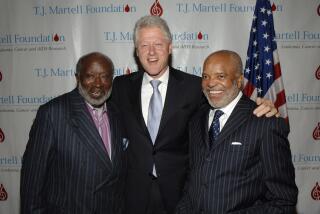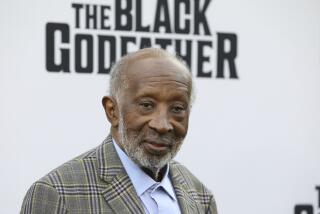Man, 72, Guilty in ’66 Mississippi Racist Murder
- Share via
JACKSON, Miss. — In the latest effort to erase the decades-old stain of racist violence in the South, a federal jury Friday convicted a former Ku Klux Klansman in the 1966 slaying of a black farmhand in southwestern Mississippi.
Ernest Avants, a 72-year-old former paper mill worker, offered little reaction when the jury returned its verdict after deliberating for just under 2 1/2 hours.
Avants faces a probable term of life in prison on his conviction of aiding and abetting a murder when he returns to U.S. District Court for sentencing on May 9.
Prosecutors cheered the swift verdict -- a triumphant finish to the U.S. government’s first murder prosecution in a civil rights-era case. During the last decade, a number of cases dating to the civil rights era have been prosecuted around the South, most of them in state court.
“We are proud of the verdict. We think this verdict reflects the way things really are in Mississippi today,” said Dunn Lampton, the U.S. attorney for the Southern District in Jackson. “There have been great changes in attitude and in understanding each other since the ‘60s.”
Avants was the lone survivor of three white men who the government said took part in the killing of Ben Chester White, a 67-year-old farmworker. The men were believed to have killed White as part of a plot to distract attention from a high-profile civil rights march making its way from Memphis, Tenn., to Jackson and, perhaps, to lure the Rev. Martin Luther King Jr. to the Natchez area to kill him too.
Avants was acquitted by a Mississippi jury in a 1967 state trial.
One of White’s two surviving sons, Jesse White, said he was relieved by the verdict. “I feel like I can see through the tunnel. We got some closure,” White, 65, said outside the courthouse. “It proves our American justice system is very much alive and well. It works. It shows the world, not just America, what we’re made of.”
Avants’ lawyer said he plans to appeal the decision, but had been braced for a conviction. “A lot of these older cases are being tried and there seem to be convictions. There’s not much you can do to defend these cases,” said Tom Royals, a Jackson attorney.
Much of the testimony in the two-day federal trial was drawn from earlier statements by one of the three men involved, James Lloyd Jones, who is now deceased. Jones had implicated Avants and Claude Fuller during court testimony in earlier hearings and in statements to sheriff’s investigators -- testimony that was read in court this week.
A former FBI agent also testified this week that Avants had confessed his role in 1967 as part of a conversation about an unrelated case.
The prosecution charged that the three men lured White with an offer of work June 10, 1966, then drove him to Homochitto National Forest near Natchez, where he was shot repeatedly and dumped in a creek. His body was discovered two days later by a family on a picnic.
According to the prosecution, Fuller, who is also now dead, shot White as many as 18 times with a .30-caliber rifle. Avants then shot White in the head with a shotgun, prosecutors said.
In the 1967 trial, Avants’ lawyer argued that his client was innocent because he had fired after White was already dead.
In the current case, prosecutors charged only that Avants aided and abetted the murder.
They were able to prosecute the case -- avoiding the constitutional ban on double jeopardy -- after discovering a few years ago that the crime had taken place on federal land, giving federal prosecutors jurisdiction.
The defense argued that Jones was a liar, and challenged evidence that a shotgun was ever used in the attack on White.
But the defense offered only one witness, who sought to rebut the ballistics evidence that a shotgun was used.
Avants suffers from congestive heart failure and the effects of two strokes.
He took his place at the defense table in a wheelchair and was wheeled out through a side door during breaks in the trial to smoke cigarettes.
More to Read
Sign up for Essential California
The most important California stories and recommendations in your inbox every morning.
You may occasionally receive promotional content from the Los Angeles Times.













